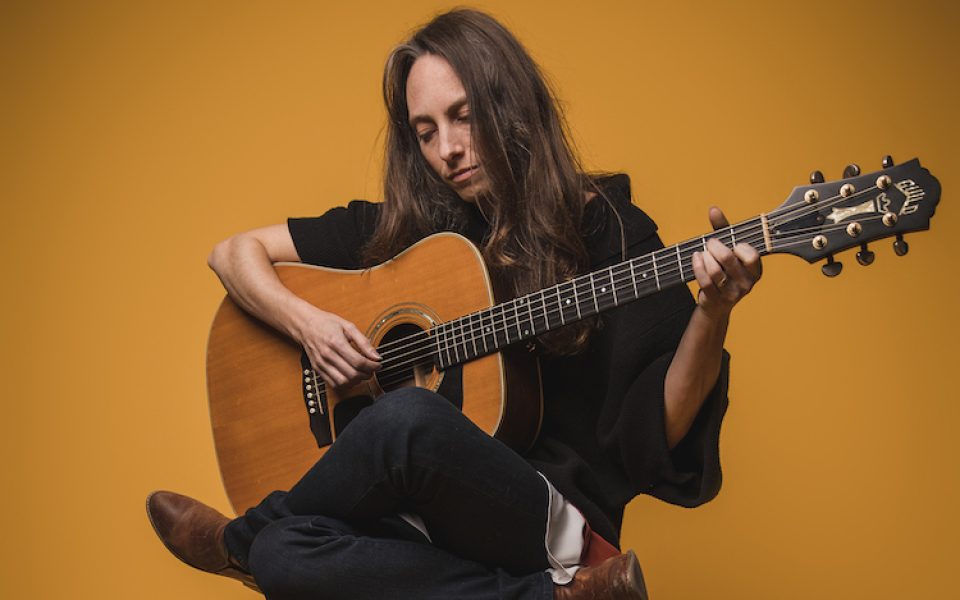There’s this character in The Green Mile, he’s really healing,” Greensboro-based singer-songwriter Abigail Dowd says, referencing Steven King’s 1996 serialized novel. “When he lays his hands on people, he opens his mouth and flies come out; fortunately for me, songs come out.”
Dowd releases Not What I Seem, her second studio album, on April 5 and performs an album-release show in the Crowne at the Carolina Theatre on April 6 with Sam Frazier and the Side Effects. Like King’s character she aims to heal, but found she needed to start at her roots. Not What I Seem is an album about reckoning: with memory and trauma; with the strange gratitude that can rise from ashes; of holding dear and letting go. It’s grittier, by necessity, than her 2017 debut Don’t Wake Me.
“I pushed the vocals a little more in this one,” Dowd says. “The first album was a little softer, more controlled. I wanted my voice to sound nice and pretty and with this one, I wanted you to hear the emotion in my voice.”
She grapples with what — and who — resides in the chasm between self-perception and others’ reception of us. The album’s title track “Not What I Seem” reveals an artist no longer concerned with being easy on the ears or eyes of others. Dowd sings,“Like Ophelia in the water, you stand and gaze upon her while she drowns/ and comment on her beauty as if it was her duty to please your eye and make you feel something inside.”
“When that lyric came out — that line about Ophelia — there’s a painting by Millias in the Tate Gallery in London, and the model for that painting caught pneumonia because she was posing in the bathtub and almost died and suffered health problems the rest of her life,” Dowd says. “She has an amazing story herself. But it’s always about the powerful man with the woman as the muse, and he makes her immortal.”
Dowd, for so long, lived under the weight of the male gaze. It was inextricable from her earliest understanding of possible paths to becoming a singer.
“I had this notion as a small child that if you wanted to be a singer that didn’t write your own music, you had to take your clothes off [like Madonna],” Dowd says. “Because I had to write my own songs first … I had it in my head that I had to be able to play the guitar. That idea ended up forcing me to get really good at the guitar, though, which I’m grateful for.”

Through re-visiting, challenging and, often, revising her life’s narratives, Dowd grants listeners permission to do the same: to mine experiences and patterns from a place of curiosity and awe for the nature of the subconscious mind. This is especially true of “Old White House.”
“I was doing shadow work, where you do deep imaginings — almost hypnosis work, going into the things that trigger you every day, and identifying them,” Dowd says. “I identified [an emotion] as shame and then, Wait, when is the first time that you felt that? It immediately took me back to this time when I was three-and-a-half, four years old. And I realized that was really heavy, and I’d been carrying it around.”
The resurfaced memory prompted Dowd to reach out to an aunt she’d distanced herself from out of subliminal association with that traumatizing time. Her aunt imparted advice she heard from Oprah Winfrey, who is vocal about the repercussions of trauma in early life: “You’ve got to go back and get that little girl.”
“I usually write the music first, so I’m playing with a guitar riff and all of a sudden the lyrics to that song fell out,” Dowd says. “I realized by the second verse what I was singing about, and that was really wild because that really was the only way I could go back and get that little girl, through the song. It’s like releasing the story and it has no power anymore, and then other people can relate to the song, and maybe it’ll be healing for them, too, knowing that they’re not alone in that. The fact that I wrote this song means I don’t own it anymore. I let the story go. And then I can sing it with a total freedom.”
Join the First Amendment Society, a membership that goes directly to funding TCB‘s newsroom.
We believe that reporting can save the world.
The TCB First Amendment Society recognizes the vital role of a free, unfettered press with a bundling of local experiences designed to build community, and unique engagements with our newsroom that will help you understand, and shape, local journalism’s critical role in uplifting the people in our cities.
All revenue goes directly into the newsroom as reporters’ salaries and freelance commissions.


Leave a Reply